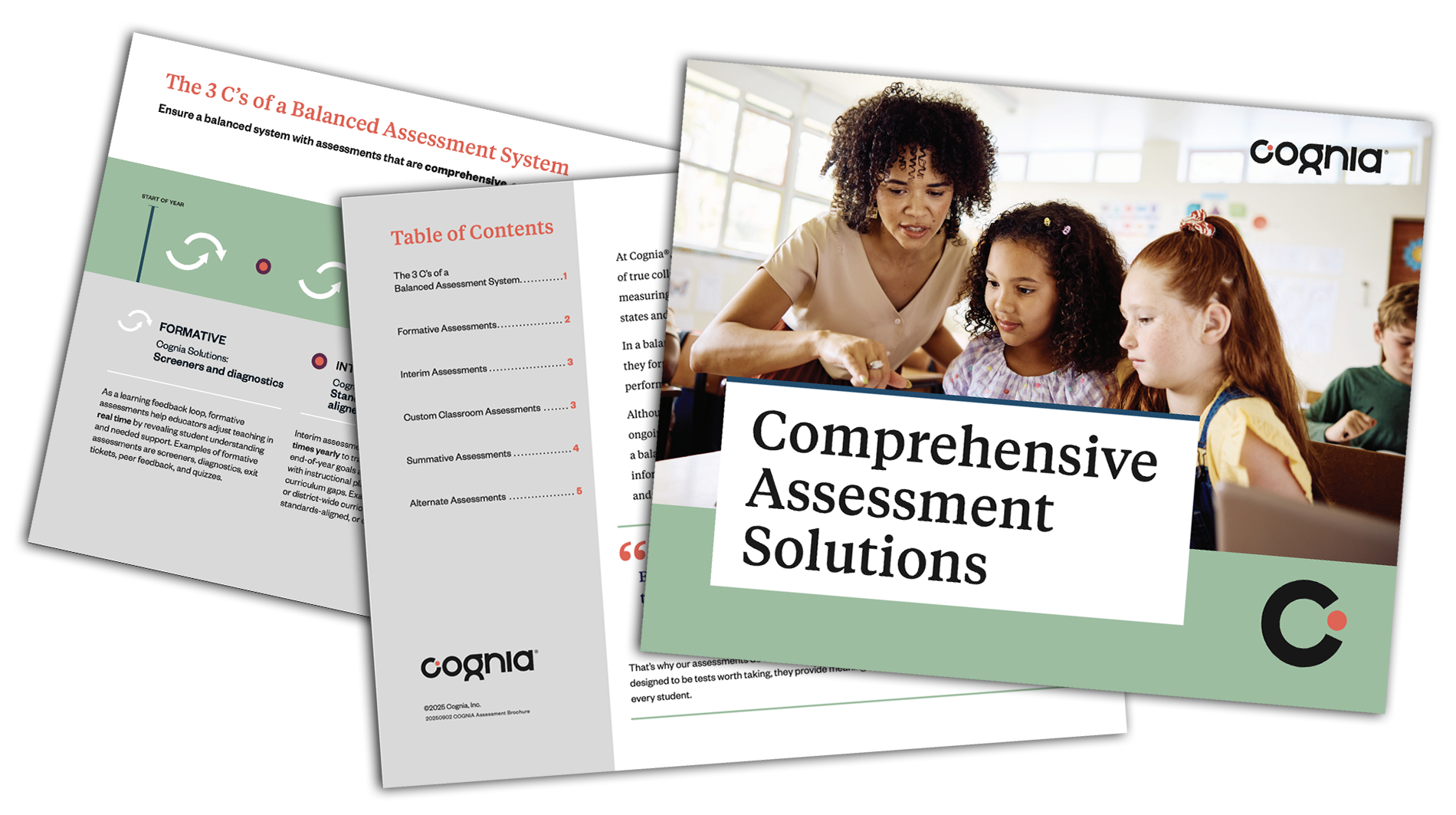Assessments for Learning
Transform student learning with actionable assessments supported by professional learning.
Support students with a comprehensive system of assessment
Measuring student learning with the right assessment at the right time can support institutions in creating coherent, comprehensive systems of assessment. Adopting a balance of formative, interim, and summative assessments yields a fuller picture of student performance data to improve learning.
Time-saving, meaningful assessments that enhance learning
Educators recognize that student assessments help tailor instruction to individual needs, but often struggle with how and when to test. We’ve developed affordable, high-quality assessment solutions that eliminate the guesswork and return the focus to teaching and learning—not testing.
Meaningful assessment has the power to transform student learning. Thoughtfully designed, our assessments:
- Can be administered quickly and easily
- Provide actionable data to enable instructional change
- Employ engaging, relevant, technology-enhanced items
- Provide opportunities for continued academic growth and success
Educators nationwide use our assessment data to enhance learning
The right assessment at the right time
A balanced assessment system gives a complete picture of student performance. This brochure highlights research-based solutions to support effective teaching and learning.
Cognia Interim Assessments
Cognia Interim Assessments, aligned to high-quality curricula and college and career readiness standards for ELA and mathematics, help educators track students’ progress against curricular goals and standards, providing insights to adjust instruction and support student success.
IM® Math curriculum-aligned interims
Subjects/Grades
- Mathematics for grades K–8
- Algebra 1
- Geometry
- Algebra 2
Features
- Three assessment forms, one each for fall, winter, and spring
- Balance of rigor: conceptual understanding, procedural skill and fluency, and application
- Available on the Otus, PowerSchool, and Kiddom platforms
EL Education curriculum-aligned interims
Subjects/Grades
- English Language Arts/Literacy for grades 3–8
Features
- Three opportunities to assess throughout the year
- Authentic passages and optional constructed response items
- Available on the Otus, PowerSchool, and Kiddom platforms
Standards-aligned interims
Subjects/Grades
- English Language Arts/Literacy for grades K–11
- Mathematics for grades K–8
- Algebra 1
- Geometry
- Algebra 2
Features
- Computer-based assessments that can be administered within a class period
- Computer-based reporting that accurately reflects progress toward end-of-year expectations
- High-quality and reliable field-tested items developed by experienced content developers
- Available on the Otus, PowerSchool, and Edcite platforms
Tailor your instruction with Cognia Interim Assessments
Cognia Diagnostics
Cognia Diagnostics are designed to pinpoint students’ learning strengths and needs to help teachers shift instructional practices and priorities at the point and time of need.
Subjects/Grades
- English Language Arts for grades 2–11
- Mathematics for grades K–8
- Algebra 1
- Geometry
- Algebra 2
Features
- Multiple forms of diagnostics assess major content at each grade/course to support instructional needs
- Field-tested, piloted assessments using high-quality items
- Available on Edcite and PowerSchool platforms, with the ability to migrate to others
Support student learning with Cognia Diagnostics
Cognia Screeners
Cognia Screeners are designed to gauge students’ level of knowledge at the start of each school year or at the mid-year, allowing teachers to tailor their curriculum and instruction to meet the needs of every student.
Math Screeners
Subjects/Grades
- Mathematics for grades 1–8
- Algebra 1
Features
- One pre-designed screener per grade, administered at the beginning of the school year
- Measures student understanding of knowledge and skills from the previous year
- Available on the PowerSchool platform with the ability to migrate to other platforms
ELA Screeners
Subjects/Grades
- English Language Arts for grades 3–9
Features
- One pre-designed screener per grade, administered at the beginning of the school year
- Measures student understanding of knowledge and skills from the previous year
- Available on the PowerSchool platform with the ability to migrate to other platforms
Meet students where they are with Cognia Screeners
Custom assessments
Cognia also has the capability to design and develop custom standards-aligned, curriculum-embedded, formative and interim assessments, as well as diagnostics to meet the needs of our partners, educators, and student populations.
We begin with a deep review of the curriculum, combined with active listening and communication, to identify specific assessment needs. From there, we suggest potential priority standards for assessment, design assessment blueprints and models, and develop high-quality assessments that measure student proficiency while aligning with the institution’s identified priorities. Clients can engage in a feedback and review cycle with Cognia assessment developers to ensure the assessments are tailored to their needs.
Professional learning for assessment literacy
With Cognia professional learning, educators can create high-quality assessments and learn to use data to improve instruction and student outcomes. We provide expert-led reviews, on-demand learning, and custom professional development. Our programs help educators understand assessment types, design effective assessments, align them with instruction, and analyze data to make informed student-centered decisions.
Frequently asked questions
With so many types of assessments, how do I know which one to use and when?
Before diving into choosing an assessment, first identify what information you are trying to learn. Do you want to know how students are performing on skills and content that was part of a recent instructional cycle, or do you want to understand prior knowledge and skill levels before instruction begins? Build an understanding of what each assessment offers and select the one that most aligns to the information you are looking to uncover.
What makes up a high-quality assessment?
A high-quality assessment is characterized by several key components that ensure it effectively measures student learning and supports instructional goals, including—but not limited to—alignment, accessibility, cognitive demand, clarity, and actionable insights.

